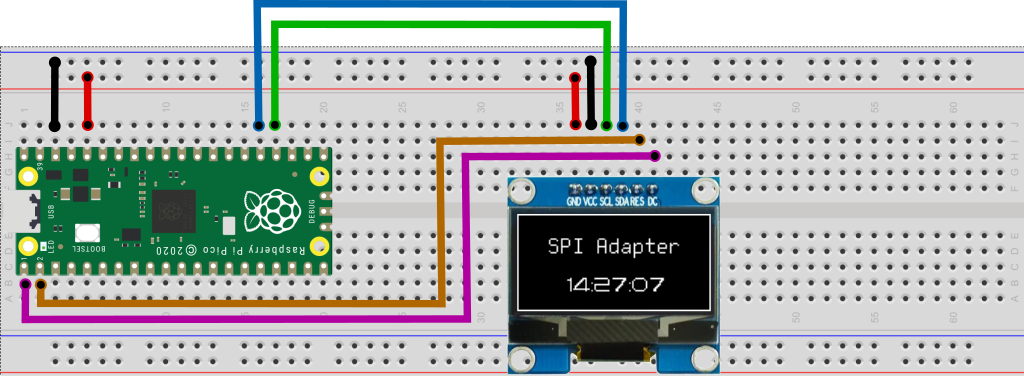The SPI Adapter allows python programs to connect to SPI devices using off the shelf low cost boards such the Raspberry Pico or SparkFun Pro Micro - RP2040. The SPI Adapter appears on the computer as a serial port (no device installation required) and acts as a USB to SPI bridge, with the spi_adapter Python package providing an easy to use API.
For example, the diagram below shows the wiring of the oled_demo.py example which drives an SPI OLED display using an SPI Adapter and the luma.oled python package.
- Provides USB to SPI bridge.
- Supports Windows/Mac/Linux.
- Uses low cost low cost off-the-shelf boards as adapters.
- Does not require driver installation (it appears on the computer as standard a serial port).
- Comes with an easy to use Python API.
- Easy to modify/extend and to adapt to new hardware.
- Permissive open source license. Comercial use OK, sharing and attribution not required.
- Provides additional 8 general purpose auxilary input/output signals.
Package installation
pip install spi-adapter --upgradeIn the example below, we use an SPI Adapter that appears as serial port "COM7" to access an ADS1118 SPI ADC device.
import time
from spi_adapter import SpiAdapter
spi = SpiAdapter(port = "COM18)
# Single shot, 2.046v FS, Input (A0, GND).
adc_cmd = bytes([0b11000101, 0b10001010, 0x00, 0x00])
while True:
# Read previous value and start a the next conversion.
response_bytes = spi.send(adc_cmd, mode=1)
adc_value = int.from_bytes(response_bytes[0:2], byteorder='big', signed=True)
print(f"ADC: {adc_value}", flush=True)
time.sleep(0.5)Full documentation is available at https://spi-adapter.readthedocs.io/
